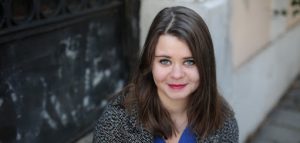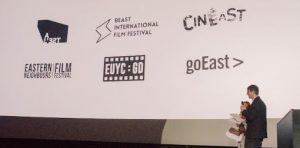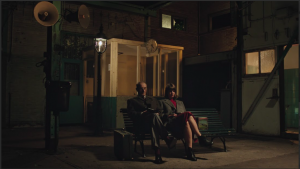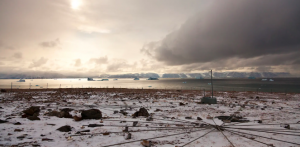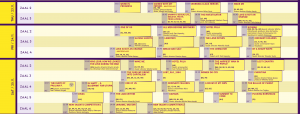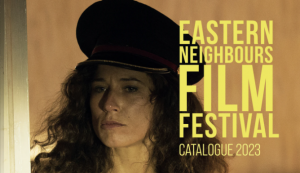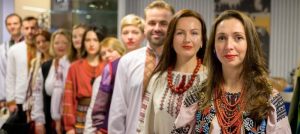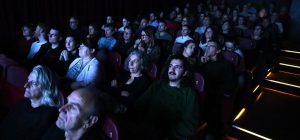
Croatian Filmmaker Dalibor Matanic Comes to de Balie With His Formula “Against Fascism”
Interview by Tatjana Lisjak
Dalibor Matanic is one of the most lucid and prolific filmmakers of contemporary Croatian cinematography. Perhaps best known abroad for the award in Cannes for the film The High Sun, Matanic is also the first director from Southeast Europe whose TV series The Paper was purchased and broadcast globally by the streaming service Netflix. Next month, on November 4, Matanic is coming to Amsterdam, where he will present his psychological thriller The Dawn (English subtitles) at De Balie. His guest appearance is part of the Eastern Neighbors Film Festival’s special screening program On Tour. The Dawn is the second part of the Trilogy of the Sun and the sequel to the film The High Sun. We spoke with the director and tried to find out more about his fight against radicalization and fascism through art and film.
The Dawn is the second part of a trilogy that has been called the “trilogy against fascism” in the media. Can you explain the personal motives that pushed you to tackle this topic?
The name of the trilogy is Trilogy of The Sun, and at its core, it fights against intolerance and hatred. My goal is to examine whether, with the help of art, love can prevail over hate, only for one day. Everything is based on some personal impressions and analyses of my family, who grew up in regions doomed by political turmoil. The question is whether this historical mechanism, the conflicts that recur every 40-50 years in our region, and which we now see not only here, but also globally, can be stopped, at least by some artistic overcoming of this theme. As for the personal motive, there are three generations in my family, starting with my grandmother and ending with me, so this second part of the trilogy deals with some details from my father’s life.
The first part of the trilogy, The High Sun, was a huge success. You won the jury prize in the Un Certain Regard competition at Cannes, the film received excellent reviews, and it was the second most commercial film in recent Croatian history. Was it so lucrative abroad?
Yes, what is incredible is that the film was widely screened in Croatia, which is great for an art house film. And what’s even crazier is that it was even more popular in Italy! Some grand Italian filmmakers like Nanni Moretti praised the film and it enjoyed cult status. The Italians offered us help and support for the entire trilogy so The Dawn was filmed in Italy, in this incredibly picturesque mountainous region that resembled the Cetina area in Croatia, where The High Sun was shot. It was a great combination for us! And that lucky circumstance, that The High Sun had a cult status in Italy and received many awards, we recognized it as the right moment to veer off the beaten track. That’s why I’m especially proud of The Dawn, because we didn’t shoot sequence no. 2, but decided to take a bolder step forward and film research. The entire film crew, from the production team of Ankica Juric Tilic, the main actress Tihana Lazovic, all the way to Marko Brdar and his photography, we all bit into the research and that is actually what The Dawn is. We consciously let the trilogy move in an unpredictable direction, and that’s why this film will always be especially dear to me.
Critics have compared your approach in The Dawn to Darren Aronofsky and David Lynch. Do you recognize the similarity in style?
That’s a compliment anyway, but I didn’t rely on such things. There are some authors with whom it can be visually compared, but we tried to find our code and unique language. It’s not so much about the famous names as it is about the atmosphere. When we started to work with actors on the set, we realized that we were doing something fresher. Yes, that’s the right word! And the funniest thing is that the Italians looked at us like we were crazy, so filming was a lot of fun.
In essence, this is a film that strikes a different chord with the audience. The Dawn goes to the inner sense, to the emotions, the inner world. Some details are consciously emotional. And the music score is like that. We didn’t use classical instruments, but musical frequencies. When you hear that music for the first time, you can’t hear it, but if you put it in a movie, it affects the audience. The Sinkauz brothers are making music for the trilogy. In their garage, there is no piano, but they have some devices and strange sounds that you don’t hear. But if you stay for an hour and close your eyes, you realize that they are causing a total storm inside you. When the High Sun was screened in Cannes, Le Monde wrote that we destroyed the sound system in the cinema. (laughs) There are a number of these small details, such as acting code, audio code, and screenwriting code… We went in some directions that we can say are specifically ours.

Although fascism is, unfortunately, a universal phenomenon, in The Dawn, we observe a local story from rural Croatia. To what extent can the audience in the Netherlands identify with the situation you are portraying?
I must admit that this concept is very intuitive and easy to identify with. As Michael Haneke says, I am only raising questions, not providing answers to them. Honestly, a lot of questions have been asked. But those who have seen the film and will see it will understand how shocked our film crew was when on January 6, 2021, rioters attacked Capitol Hill in Washington. That moment, that’s something we have in our movie. It’s insane, this similarity, but a similarity that comes from some internal code, from some mass arising from some new wave of hatred, segregation, intolerance. This hatred and intolerance surround us, and precisely because we don’t know what will happen, things are more terrifying. That’s why I made a film based on creepiness, on something insidious and inexplicable, but it exists and you know it’s possible. And then Capitol Hill happened and we saw all these shamans and madmen attacking, and that’s exactly what we’re talking about in The Dawn. What was interesting to me, was contrasting that horrible reality with a family that has serious problems putting itself together. How can an individual from such a family, who barely manages, be responsible for the emergence of this new fascism? Such a man who is barely emotionally composed can no longer be a tool or the meat used by fascism and such systems to produce a mass that follows them headlong.
The parents in The Dawn are played by the marvelous Kresimir Mikic and Tihana Lazovic who was one of the Europe Shooting Stars in 2016 at the Berlinale. You often work with the same actors, some of them have been with you since your first film Fine Dead Girls.
I’ve been working with that ‘’rascal’’ for 20 years. (laughs) I’m glad he did roles like the ones in The Dawn and now in The Last Social Artefact, but he’s always been good. Tihana is the one I tied with this trilogy. Actors like them, who do not stick to the given script and who insist on exploration and progress, that is the most important thing in the artistic code. To have any opportunity to play because if you don’t play then you follow the beaten path that everyone expects. Like, ‘’art is there to entertain, the economics is there to worry’’. And it doesn’t have to be like that, art can also talk about what happens in front of our doors. Lately, I’ve had the opportunity to do a series with a lot more actors than usual, so I’m trying to get some new names. Yes, I have a certain base of people I like to work with, but I’m constantly refreshing projects with new names.
In addition to films, you have also achieved enormous success with the series. The Paper is the first-ever series from Southeast Europe bought and globally distributed by Netflix. Later came Silence, which was recently shot in Ukraine, and The Last Social Artefact. When will we be able to see them on one of the popular streaming platforms?
After the success of The Paper, all doors were open for us. It was much easier when we were working on Silence. Frankly, I think in Croatia it is less known for its success than abroad. Now that The Last Social Artefact has collected all those awards, we are negotiating with potential distributors. Unfortunately, the process is long. With The Paper, it lasted two years. Silence has already entered HBO and is sold all over the world, so it has a promising future. Now we are focused on the American market. Crime series are doing well there, but Silence is an atypical crime series, done in my way. I am sure that each of them will find their global place.
And finally, when can we expect the third, final part of the trilogy that will be inspired by you?
It’s a question of script, funds, money… I hope that we will start filming as soon as possible, maybe next year or the year after. And to finish with the love code. So that everything doesn’t go dark.
SCREENING: November 4 at 19:30 hours at De Balie, Amsterdam


